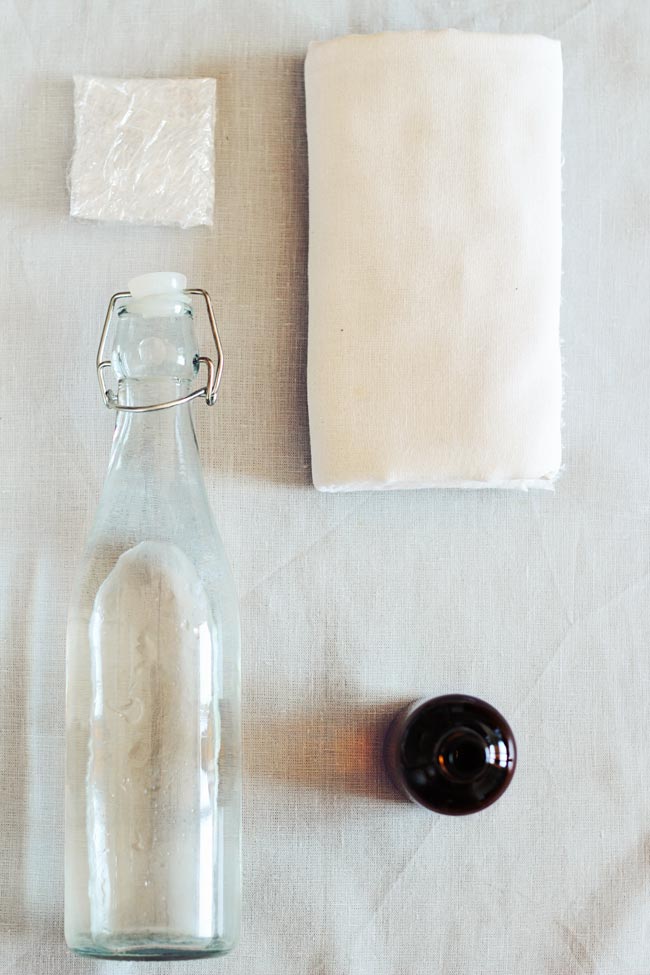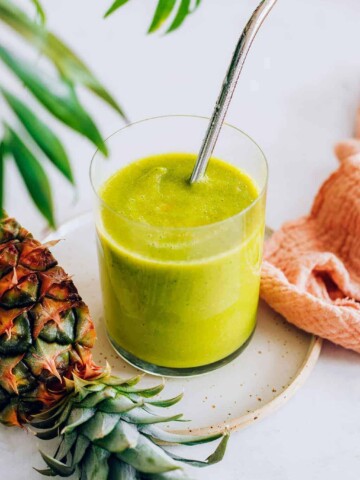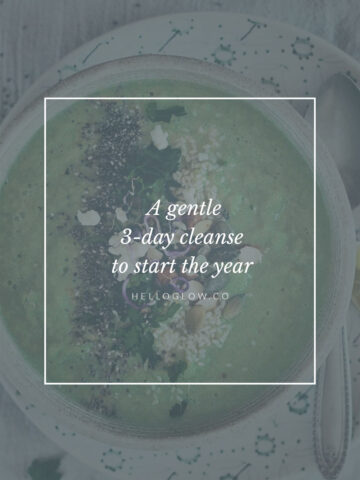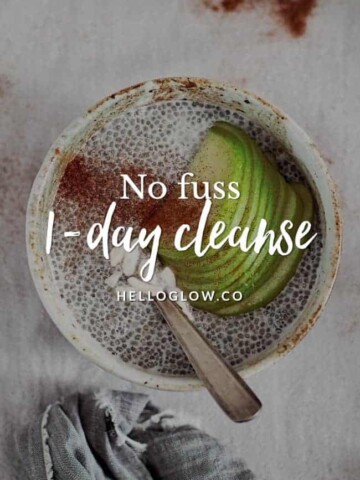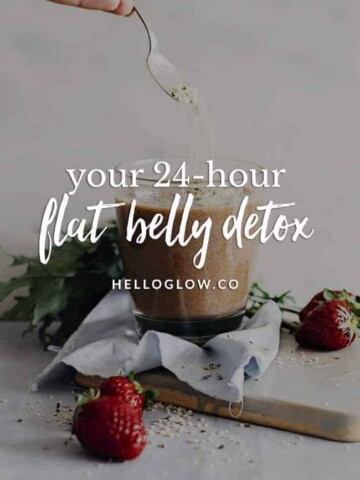There's nothing like a case of the bloats to make you completely miserable. Whether it's because you ate too much, you're retaining water, your gut isn't working as it should, or you're PMS-ing, it's hard to go about your day when you feel like a balloon.
That uncomfortable, puffy feeling is enough to send most people to the couch for the duration, but there are many easy, natural ways (including just watching what you eat) to deflate and feel normal again.
What causes bloating
Bloating symptoms stem from digestive issues (usually gas or air in the abdomen or an associated problem in your GI tract). About 30% of adults have reported bloating, but most people with irritable bowel syndrome (IBS) get it regularly [source].
Causes of gassy bloating:
—FODMAP foods sensitivity
—Irritable bowel syndrome
—Too much sugar
—Highly processed foods
—Cruciferous vegetables and legumes
—Overeating
—Overindulging in fatty foods
—Eating too fast
—Chewing gum
—Using a straw
—Abruptly increasing your fiber intake
—Physical inactivity or overactivity
—Stress and emotional anxiety
—Altitude changes (airline travel)
—Food allergies
—Carbonated beverages
—Alcohol
—Constipation
—Recent antibiotic use
—Recent viral gastroenteritis
Puffiness is due to swelling or edema and is usually caused by fluid retention from excess salt.
A few factors that contribute to puffiness are:
—Hormones
—Excessive salt intake
—Highly processed foods
—Sitting or standing for long periods
—Poor kidney function
—Protein deficiency
—Oral contraceptives
Any of these issues—or a combination of them—can cause that awful feeling.
If you have chronic bloating, it's a good idea to check in with a healthcare professional to make sure a larger medical issue isn't at play. If it's occasional or mild bloating that's plaguing you, avoiding certain foods and drinks (and turning to others) can help you feel normal—and button your pants—again.
What to avoid when you're bloated
If your belly's feeling bloated, take a day off from these foods and drinks. This is tricky because many of them (like kale, garlic, cauliflower, and seltzer water) are otherwise healthy staples. But due to their chemical makeup, they can make you feel worse when you're already bloated.
If you're retaining water, you'll want to avoid salt (which is extra difficult to do if your swelling is due to PMS and you're craving potato chips...)
Carbonation can increase discomfort—although I've found carbonated water can help you burp, which may help alleviate symptoms (so ladylike, I know)
Spices: Black pepper, nutmeg, cloves, chili powder
Spicy foods (sorry, Sriracha)
Limit onions and garlic, and other high FODMAP foods
Vinegar-y condiments like mustard, barbecue sauce, horseradish, ketchup, tomato sauce
Chewing gum
Dairy products (except for probiotics like plain yogurt and kefir)
Tofu and soy products
Cruciferous vegetables like Brussels sprouts, broccoli, kale, cabbage, and cauliflower (especially raw)
Legumes like beans, peanuts, and lentils
Sugar and sugar substitutes, especially high-fructose corn syrup (including plant-based sweeteners)
Coffee
Fruit juices
Processed meats
What To Eat + Drink to Beat Bloating
Turn to these foods and beverages to help you deflate:
1. Water! Water! Water!
2. Chia seeds
3. Lemon
4. Diuretics like celery, parsley, romaine lettuce, pineapple, grapes, beets, melons, cucumbers, and asparagus
5. Potassium-rich foods like peas, sweet potatoes, winter squash, kiwi, and bananas
6. Cooked or steamed veggies (cooking will make them easier on your digestive system)
7. Probiotic drinks like yogurt, kombucha, and kefir [source]
8. Rosemary, basil, mint, turmeric
9. Whole grains like brown rice and quinoa (avoid if your bloating is due to a recent increase in fiber intake)
10. Low FODMAP foods [source]
11. Ginger
A Day of Bloat-Busting Recipes
Morning
Infused water: Infusing your H2O with fruits, veggies, and herbs will encourage you to drink more. Fill a pitcher in the morning, and you're all set for the day.
Healthy Apple-Cinnamon Chia Seed Pudding: Green apples help regulate your gut, while chia and cinnamon are anti-inflammatory.
Bloat-Busting Pineapple Smoothie: Pineapple is also anti-inflammatory (as are all of these fruits) and helps beat bloating, and coconut water includes potassium.
Afternoon
Antioxidant Punch Juice: Celery, lemon, and dandelion greens will provide a ton of antioxidants and anti-inflammatory nutrients and help you rehydrate. Omit the lemon if the acid will upset your stomach more.
Creamy Vegan Butternut Squash Soup: This vegan soup is filling but won't leave you feeling even more bloated. Add some rice crackers and steamed/roasted beets or carrots on the side if you like.
Coconut Chia Pudding: For a tasty, creamy dessert—without the bloat from dairy—try this luscious coconut pudding full of protein and healthy omega-3s.
Evening
Ginger Chicken Lettuce Wraps with Tzatziki: Mild romaine, combined with anti-inflammatory ginger, hydrating cucumbers, and probiotic-rich yogurt, makes for a substantial but soothing meal. Add a side of rice or quinoa for more sustenance.
Probiotic Smoothie with Kefir: Get your digestion back on track with this hydrating savory probiotic smoothie.
Turmeric Tea: Drink this before bed to decompress and de-bloat.
Natural Ways to De-Bloat
Exercise
You may not want to hear this, but...exercise is a great way to de-bloat. Plus, that serotonin boost is priceless, which is a bonus if you're CWB (crabby when bloated) like I am.
No need to run a marathon, though. Just something low-key—a quick yoga session or some active playtime with the kids—will do it.
Massage
Getting a massage can also be a great and relaxing way to ease fluid retention. Avoid temperature extremes if at all possible. If you're retaining fluid in your ankles or feet, prop them up above your heart.
Castor oil
Another way to de-bloat is to do a castor oil pack. Legend (and anecdotal evidence) has it that this simple home remedy helps move everything through the liver and gut, heals inflammation, improves circulation, makes you more regular, and aids lymphatic function. A naturopath told me about this, and it has seriously changed my life.
How To Do a Castor Oil Pack
Important: You're not supposed to do a castor oil pack if you're pregnant or menstruating. During the premenstrual period cramps, they are totally fine, though. If your periods are irregular, you might even find doing occasional castor oil packs can help them become more consistent.
Supplies needed
—Castor oil - make sure to use a cold-pressed variety like this
—Flannel - you can cut up a piece of clean flannel, wool, or cotton, or buy one like this and cut it into a square big enough to cover either your abdomen or liver area. (I usually go with a 5" x 5" piece.)
—Hot water bottle or heating pad
—Glass jar or dish
—A large old towel (you may need 2)
—Plastic wrap or a plastic bag - you'll need enough to more than cover your flannel square.
*TMI, but I usually just get naked to do this. If that's not an option, wear clothes that you won't mind getting stained with castor oil. It will stain!
Instructions
1. Set up your towel underneath where you'll sit or lay: on the couch, floor, bed, or chair.
2. Turn on your heating pad (medium heat is good) or get your hot water bottle ready.
3. In a glass jar or dish, soak the flannel in a tablespoon of castor oil at a time until it's pretty saturated but not soaked.
4. Lie down on the towel(s) and place the castor oil-saturated side of the flannel square over the affected area. You can either put it over your abdomen or over your liver (just below your right breast). Fold over any extra fabric.
5. Place the plastic wrap or plastic bag over the flannel, ensuring all the flannel and oil are covered.
6. Place the hot water bottle or heating pad over the plastic and let sit for 45–60 minutes while you relax, read, or watch TV. (I prop myself up in a chair to do this while I catch up on all the articles I've bookmarked throughout the week.
7. Remove the pack and gently set it aside on a sink or towel.
8. I usually do a castor oil pack right before I'm going to take a shower, but you can clean the area with water and a bit of baking soda to remove the oil.
9. Save the castor oil pack in a plastic bag or glass jar in the fridge or another cool, dry place. You can reuse it about 5–10 times before making a new one—just add a little more oil next time.
My naturopath recommended doing a castor oil pack three consecutive nights/week (for up to a month) during intense periods of bloating.
Right now, I do them two nights/week twice a month, and I'm sure I feel a difference the days after I do one! I wake up with more energy and definitely feel less bloated and lighter.
Have you ever done a castor oil pack? What did you think?
This post was medically reviewed by Dr. Kimberly Langdon, M.D., a university-trained obstetrician/gynecologist with 19 years of clinical experience. Learn more about Hello Glow's medical reviewers here. As always, this is not personal medical advice, and we recommend that you talk with your doctor.
324

